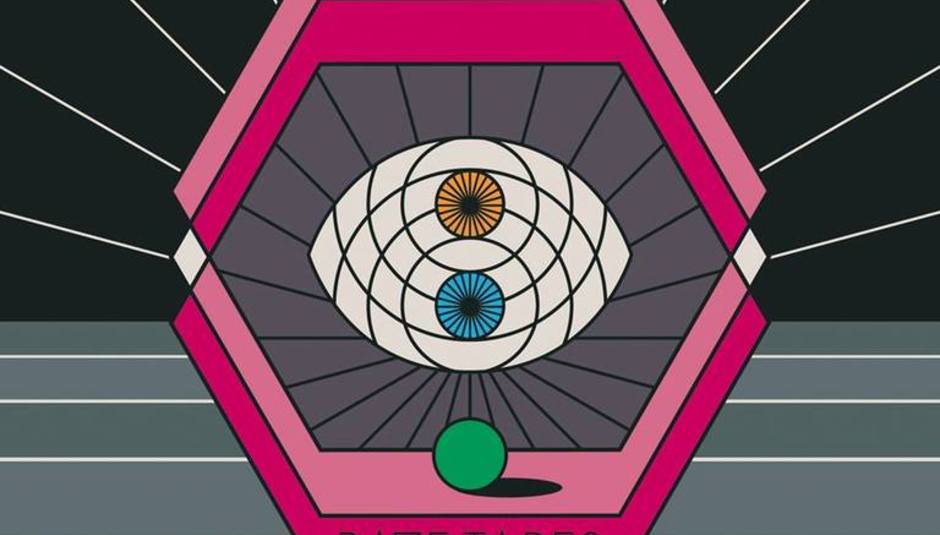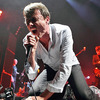“We’ve never actually been that far down there before, to the south west. There were something like fifty-two pubs in a village of a few hundred people.” Mogwai’s Barry Burns - it’d be quicker to list which instruments he doesn’t play for the band at this point - is back in his adopted hometown of Berlin, having spent the weekend in Dingle, a tiny Irish town that hosts a series of artists every winter as part of the the Irish music TV show Other Voices. “It was a much bigger operation than I thought it’d be; we were playing inside this little church. We decided to be selfish about it, and played five new ones in a six-song set.”
Said new ones were plucked from Rave Tapes, January’s follow-up to Hardcore Will Never Die, But You Will; let it never be said that the band don’t possess the sharpest of appetites for a delightfully tongue-in-cheek title. It’s a record that continues the Mogwai progression into more melodically complex territory; fans of the spine-tingling loud-quiet dynamic employed on their early records would be well-advised to stick to keeping the likes of ‘Mogwai Fear Satan’ and ‘Like Herod’ on repeat. There’s plenty for Burns to reflect upon on this particular cold December morning, with the past twelve months having also having seen the Glaswegians soundtrack the acclaimed French supernatural drama series Les Revenants, as well as put together painstakingly crafted live performances of their score to Zidane: A 21st Century Portrait.
Rave Tapes seems compositionally similar to Hardcore Will Never Die, but it sounds like there’s a darker edge to it. Was that deliberate?
The last album was a lot more upbeat than this one, for sure. I think we just let this record take us where it wanted to go; we had a few conversations about what we wanted out of the album, but they didn’t really come to much. We just threw ourselves into it. We had a few new instruments to play around with; we bought some old analog synthesizers, so there’s a lot of that. We only really talked about the silly things, little minor details like “maybe there shouldn’t be so many cymbals on this one,” or “it might sound better if you don’t play on the chorus.” I suppose we did want to strip it back a little bit, but we didn’t seriously talk about what we were aiming for.
How did you go about writing for the album? Was it a collaborative process?
Yeah, we were sending ideas back and forth to each other constantly. I was over here, and I was going to my little studio; it’s nowhere near my house, which is a very good idea. I sat in there and played around with these new synthesizers and sent what I came up with to the guys, and waited for what came back. I suppose the big difference, this time, was that Dominic [Aitchison, bass] wasn’t all that involved; he’s just had a baby, so he had bigger things to be getting on with. He’s actually taken on the role of playing synthesizer bass now; he bought himself a little bass station thing, which was very unexpected, but I’m glad he did it. He played a lot of that when we went in to record.
How long did the album take you to finish? I know you didn’t go in to record it until after the summer.
We were just talking about it the other day; it worked out at about nine months from the very start to the very end, but we actually only had the rehearsal space for something like a month - maybe not even that, maybe just three weeks. As usual, we like to make things difficult for ourselves; we put the Zidane gigs in and played a charity gig as well, so we had other things to focus on over the summer. It did feel like we didn’t really have enough time to rehearse, and we ended up writing a lot of music in the studio, but we’ve always done that anyway.
Did you take anything from the experience of those Zidane shows into the recording process?
Not really; it almost felt like we were doing cover versions, because we hadn’t played most of that stuff since we recorded it. We did more rehearsing for those gigs than anything we’ve ever done before; we spent a lot of time sitting and looking at little screens playing the film, so we knew when to change song. It was really quite meticulous, for us at least - it was probably really sloppy by anyone else’s standards. We found it pretty difficult, but we didn’t take anything from it where the new record’s concerned. If anything, there was more of a hangover from the work we did on the Les Revenants soundtrack - we bought new instruments and guitar pedals for that, and they turned up in the studio for Rave Tapes.
What was that experience like? Is it more challenging working on something with a set mood and visuals than it is on your own records?
The challenge was the timeframe we were given, I suppose. I mean, the great thing about it was that you’re getting this concurrent feedback from the director and the music editor; they’re giving you guidance all the time, and it’s great having that dialogue. The difficult thing was having them come to us and say, “we’ve just filmed this extra little part here, can you write us thirty seconds of music to go with it?” and obviously the turnaround time was always pretty tight. But I enjoyed that way of working; in the studio, you’re on your own, you know? You’ve just got to turn it out. You don’t find out what people think of it until afterwards. It’s a lot more insular.
Are you going to be involved with the next season of the show?
Yeah, I think so. They were speaking to us three or four days ago, just before we went to Ireland. I think we’ll be doing the next series, but I’m not sure how much work it’s going to be yet. We’ll be on tour a lot of next year, and I think they’ll be reusing some of the stuff we’ve already done, but they’ll need new pieces for where they’re introducing new characters, things like that.
On the new album, there’s a track called ‘Repelish’ with a spoken word piece running through it. Google couldn’t tell me where it came from - where did you find it?
In the bar that my wife runs, there’s a jukebox and she had the idea to ask people that I knew to make mixtapes for it. Geoff Barrow from Portishead had sent us one, and the first track is this excerpt from a Christian radio show in America. I think he got it from [New Jersey community station] WMFU, they have an archive of that kind of stuff. Anyway, we had to re-record it because we were a little bit worried; we’re basically taking the piss out of the guy, and it’s difficult to take the piss out of Christians without getting yourself into trouble. A friend of ours from Chicago did it for us, and I think we all actually agreed that this new version sounds better.
You’ve had spoken word feature on your records before, and you’ve had the odd song with traditional vocals on it, too, like ‘Blues Hour’ on this album. How do you decide which tracks need vocals adding to them?
It’s pretty straightforward, really; it’s when we get to the end of a song and realise it just sounds like five guys playing chords, and there’s no melody to it. You have to keep it melodic. You hear it back, and you think, “oh right, that sounds completely dodge. We’d better put some singing on there.”
I noticed there’s some heavily distorted vocals on ‘The Lord Is Out of Control’, too.
Yeah, that was actually one of the first things I came up with using my new synths. I’d already decided, pretty early on, that I wanted to put vocoder on that, and it worked pretty well. The original title for it was ‘Church’, because I thought it sounded like a hymn, and I was pleased with how it came out when we played it in the church in Ireland the other night. Hymnal? Is that a word? That’s what that track is.
Paul Savage produced again, after working on Hardcore Will Never Die, and Young Team all those years ago; what is it about him that keeps you going back to him?
I think it was just that the process was so easy last time round. We get on with him really well, and it’s nice to have that guy who’s not in the band there to kind of lean you away from wrong directions you might be wanting to head in. He’s just a calming influence, and that was especially important on this one, where we really were running out of time towards the end. He kept us going at a good pace, I think.
You just played the last ever ATP Weekender at Camber Sands, which was pretty fitting given that you must’ve played there as many times as anybody else.
Aye, apart from Shellac. I think they played it more times than it was even on!
What was the atmosphere like? Were you all sorry to see it coming to an end?
There was genuinely a real party mood. I think they saved all the sad stuff for the end, which I missed; I had to be at the airport really early the next day, so I couldn’t stay to have a drink with everyone. I was talking to a girl who works for ATP, and she was saying they had everybody up on stage at the end, playing ‘All Tomorrow’s Parties’, the Velvet Underground song, and there were a few tears, I think.
It’s a shame for them that it’s finishing; it was probably a bigger deal for them than it was for us, honestly. It was probably my favourite one we played, though. I was saying before, maybe in a few years, they might bring it back. That’s the fashionable thing for bands to do, right? Reform a few years down the line. As long as it’s still there, mind. Camber Sands might’ve been swallowed up by then.
By the time Rave Tapes is out, the band will have been going for nearly nineteen years.
Fucking hell. That’s older than some people.
I know that you, personally, haven’t been there from the very start, but have you noticed any major changes in the way you work together over that period?
I think, when I joined the band, we were more into getting songs finished before we went into record; not all the time, but we’d go in with more then fifty percent of the songs done. These days, it’s probably nearer twenty percent. To be honest - and I can’t speak for the rest of the band here - I really enjoy the pressure of having to come up with a part really quickly. I’ve done it for other bands in the past - I worked like that when I was doing stuff with Malcolm [Middleton] and Aidan [Moffat] from Arab Strap - so it’s something I’m used to. I don’t think Martin [Bulloch, drums] thinks that way, mind. I think he likes to have his parts finished, but he never can because the rest of us get in his way.
I suppose the fact that you’re all still friends and have a good working relationship all these years down the line is an achievement in itself, really.
Oh, definitely. We’ve pretty much grown up with each other. Even if we’re not a good band, as such, we’re good at being in a band. We’ve definitely learned how not to step on each other’s toes, and I think that’s probably been the demise of so many bands that could’ve gone on to much bigger things.
Is touring more difficult to commit to now, given that some of you are married and have kids?
Aye, I think so. I don’t have any kids - yet, anyway - but there’s three between the band members. It’ll be hard for Dominic, with his being so young; he must be freaking out about it. Martin’s more seasoned - he’s got two now - but one of his is young, as well. It has to be difficult, when you’re leaving more than one person behind all of a sudden. I think we’re going to do fewer dates and maybe try to do bigger shows, but it’s not really up to us, if people want to come to see us. I mean, you never know. I might be wildly overestimating our popularity, there. It might be a very short tour. We’ll see. I hope not.
Do you think it’s harder to make a living now as a musician that it was in the early days? Especially now that you’ve got streaming services like Spotify getting away with paying artists fractions of pennies per listen...
It is, but it would’ve been a whole lot harder if we hadn’t had the good sense to decide to release our own records a couple of albums back. It kind of shocked us to find out how much money we could get for each record sold, compared to how it was when the label was taking a lot of that money. We’re in a really fortunate position. The demise of the record industry did affect us - of course it did - but we were lucky enough to be able to ride it out. People like to buy our records on vinyl, which helps.
That was actually something that was really obvious when Les Revenants came out; we noticed a lot more people were buying the digital release, and that’s not the way it’s been, historically, with our established fanbase. It’s always been the physical releases that we’ve done well out of. We could tell we had new people listening as a result, and that’s helped again - you’ve really got to do stuff like that now, if you want to keep making records. You know, you tour, and you make an album, but you need to do these kind of extra-curricular things as well. They keep people interested in the band, and the band interested in itself.
What can we expect from your upcoming live shows? Are you going to play plenty of older material? Will it all be as loud as ever?
Aye. We usually play for a long time now - you know, long sets - and we’ve got so many songs to choose from. It’s quite nice; we’ve been out on tour with bands that play the exact same set every night, and I couldn’t imagine doing that. It’s probably what you’re meant to do, but I find that even just changing the order up helps you out on a long tour. So, there’s not going to be fireworks. We’re just going out to play some music to people who probably rarely get out of their bedrooms. That wasn’t a very nice thing to say, was it?
If there’s a sudden drop off in ticket sales after this piece goes up online, you’ll know why.
Aye, my fault again!
I noticed that one of your songs (New Paths to Helicon, Pt. 1) has just been used in a video supporting the yes campaign for next year’s Scottish Independence referendum. How optimistic are you about a win for the yes vote?
I think it’s going to be close. The only problem is, all the people we talk to are artists and musicians and folk in the creative industry, and generally they’re all behind the yes campaign, you know? I haven’t spoken to many Scottish people that have said they’re going to vote no. The whole thing seems pretty weird. Until the referendum became a reality, it wasn’t something I’d really been rallying for.
The other thing is explaining to English friends of mine that it’s not a vote against them. They all seem a bit pissed off by it, but it’s not a negative thing towards them, it’s a positive thing for us. A lot of people in the north of England are probably asking if they could come with us. It’s taken on a real political edge now, because the Conservatives have completely ruined the country yet again. They’ve got, what, one MP in Scotland? It doesn’t really make sense to carry on putting up with them. The rules need to be rewritten, and this is a good way of doing it.
Rave Tapes is available January 20th via Rock Action. Mogwai tour the UK on the following dates:
22nd January, Mill Volvo Tyne Theatre, NEWCASTLE
23rd January, Royal Festival Hall, LONDON
24th January, Royal Festival Hall, LONDON
27th January, Bridgewater Hall, MANCHESTER
28th January, Royal Concert Hall, GLASGOW (Celtic Connections festival)
Related Reading
1) [Some Goals Are Bigger Than Others #1: Mogwai on Zidane, football and music])http://drownedinsound.com/in_depth/4146718-some-goals-are-bigger-than-others-1--mogwai-on-zidane-football-and-music)
2) mogwai.co.uk
3) Mogwai takeover week on DiS, featuring various contributions by the band
[94075]: http://dis.resized.images.s3.amazonaws.com/540x310/94075.jpeg






















